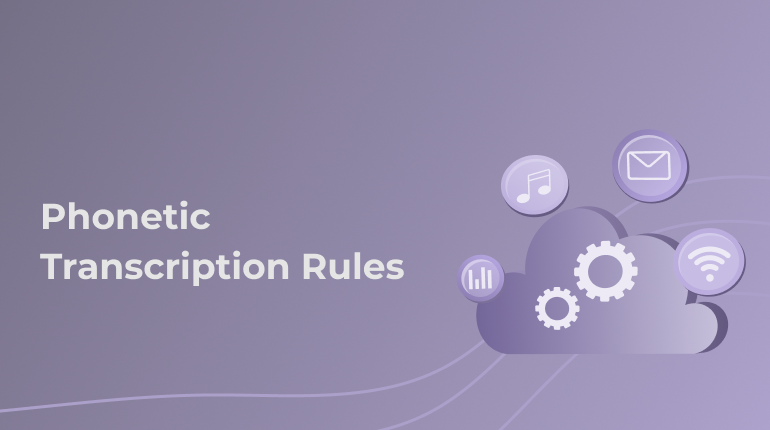Phonetic Transcription Is The Key To The Correct Speaking

Non-native English speakers apply for phonetic transcription often due to notable differences between spelling and pronunciation or beginning level of knowledge. But there are cases when native English speakers need phonetic transcription too. This article is about the necessity and nuances of phonetic transcription in the overall scope of the studying process. Learning how to deal with it will ease the studying process and polish speaking skills.
Definition of Phonetic Transcription and Differences in American and British English
Even if the word «phonetic» looks unfamiliar, you have certainly worked with it at least once in your life while working with dictionaries. Phonetic transcription provides information, usually in brackets, about the pronunciation of words. It is necessary because the spelling often distinguishes from pronunciation.
Each English sound has a peculiar symbol according to the International Phonetic Alphabet. For instance, the phonetic transcription of the word «satisfaction» is [ˌsætɪsˈfækʃn].
It’s always worth paying attention to phonetic transcription to know how to pronounce the word correctly. Some terms have similar spelling, for instance, «height» and «weight,» but different pronunciations: [haɪt] and [weɪt] subsequently.
Not all vocabularies provide phonetic transcription. Those who care about it should choose the one that has this information.
Some words in English vary according to the country of origin. The phonetic translation indicates these differences. For example, «popular» has a similar spelling in America and the UK. You should pronounce it the following way: [ˈpɑːpjələr] for American English, but [ˈpɒpjʊlə] for British. The word «birth» pronounce ]bɜːrθ] in American English, but [bɜːθ] in British. Advanced learners usually write two phonetic transcriptions for the same word, although it occupies a lot of space.
Cases of Phonetic Transcription Usage
Phonetic transcription becomes necessary when you:
- work with foreign text;
- deal with many unfamiliar words in the text;
- do socio phonetic, forensic, or pathological analysis;
- study audio full of specific terminology;
- have hearing disabilities and can not listen to the correct pronunciation.
If you want to boast a pure English pronunciation, you should know how each word correctly sounds in English. For beginners, the symbols look scary and unclear at first. Applying phonetic transcription more frequently, you gradually learn all characters. It will ultimately yield results.
Phonetic transcription is relevant for the numerous types of documents, such as:
- academic works;
- literature of any genre;
- vocabularies;
- song lyrics and speeches, and other TV content (especially for performers who sing or speak in foreign languages).
Many fields and contexts require transcription: from meetings, speeches, and interviews to narrow-professional scientific purposes. Phonetic transcriptions are necessary for all involved in the language learning process, e.g., linguists, speech-language pathologists, dictionary makers, interpreters, social media workers, and constructed language creators. All of these fields demand an in-depth consideration of the correct pronunciation, focusing on the speech sounds. Phonetic transcription provides comprehensive information on this matter.
Phonetic and Phonemic Transcription
Phonemic transcription is the pronunciation of native speakers and writing systems, while phonemic one is how people interpret it. The phonemic script is broader and represents speech as a unique character for each language phoneme in forwarding slash brackets and supposes abstract mental pronunciation. Compared to phonemic, phonetic transcription is narrower and involves the articulatory features of the word.
Both types of transcription have their purposes. Phonemic transcription is the method to record phonemes as a mental description acceptable for a usual speaker. Phonetic one represents the spoken version of the phonemes in the combination of a particular word and is the perfect pronunciation. The benefit of phonemic transcription is its simplicity. That allows reading words and phrases quicker.
Writing systems have standards that do not allow representing too many details, only the words that users can recognize immediately. Hence, phonemic transcription is more efficient despite its imperfections and simplification.
Both types of transcription have their purposes. Phonemic transcription is the way to record phonemes as a mental description usual for an ordinary speaker. Phonetic one represents the spoken version of the phonemes in the combination of a particular word and is the perfect version of the pronunciation. The benefit of phonemic transcription is that it is easy to do, which allows reading quicker.
The Assistance of Professional Transcribers
Since most online vocabularies represent how to say a word correctly, knowing the pronunciation of a few words is quick and convenient via the Internet. But if you need a phonetic transcription for a video, audio, or text document with a length of several hours or pages, the assistance of professional transcribers remains indispensable.
Our transcribers will represent the sound speech with a separate symbol according to the International Phonetic Alphabet. Utmost accuracy and the highest level of attention to detail are the most valuable features of our experts.
Ordering your document or project in our company is your guarantee to receive the ready task of high quality in time within the settled deadlines. The expanded experience of our specialists allows handling the order of any complexity for both phonetic and phonemic transcription.
The role of the human transcriber is crucial. A trained specialist pays attention to the dialect, accentual specificity of each word, maintaining all requirements. To the discretion of the transcription expert, the decision of standardization all over the document might appear appropriate too.
To provide the transcription of perfect quality, you should inform our specialist about the purpose of your project. It will help to determine the right level of details and necessities of the speech for your project. General recording metadata, the preferred format of the outcome file, a glossary are desirable too. This information will enhance the overall quality of transcription even more.
Contact our customer support center for any questions. We are always glad to assist.